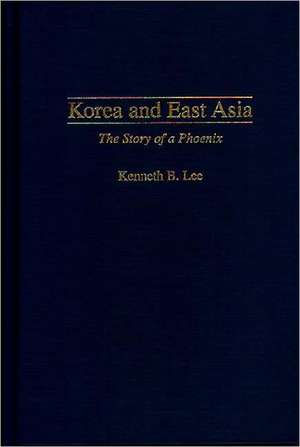Korea and East Asia: The Story of a Phoenix
Autor Kenneth Leeen Limba Engleză Hardback – 17 iun 1997 – vârsta până la 17 ani
Preț: 464.40 lei
Preț vechi: 610.60 lei
-24% Nou
Puncte Express: 697
Preț estimativ în valută:
88.87€ • 92.44$ • 73.37£
88.87€ • 92.44$ • 73.37£
Carte tipărită la comandă
Livrare economică 12-26 aprilie
Preluare comenzi: 021 569.72.76
Specificații
ISBN-13: 9780275958237
ISBN-10: 027595823X
Pagini: 312
Dimensiuni: 156 x 235 x 29 mm
Greutate: 0.65 kg
Ediția:New.
Editura: Bloomsbury Publishing
Colecția Praeger
Locul publicării:New York, United States
ISBN-10: 027595823X
Pagini: 312
Dimensiuni: 156 x 235 x 29 mm
Greutate: 0.65 kg
Ediția:New.
Editura: Bloomsbury Publishing
Colecția Praeger
Locul publicării:New York, United States
Notă biografică
Kenneth B. Lee has held positions as chairman and professor of the Korean Department, Chief Research Division, and dean of the Germanic Language School of the U.S. Defense Language Institute./e Born in southern Korea and raised in northern Korea, he studied at Korea University, New York University and Stanford University, and received his PhD from the University of Southern California. He has also been Professor of East Asian Studies at Chapman University and Program Chief of Korean and Japanese Studies at Monterey Institute of International Studies. He has published widely on Korea.
Cuprins
ForewordPrefaceIntroductionAcknowledgmentsThe Early Period of KoreaThe Early Beginnings and Racial Origins of KoreaEarly Korean Kingdoms Noted in Mythological TalesEarly Korea and China, 200 BC-700 ADKorea and Early Japan, 200 BC-700 ADThe Early Middle Period: Unified Silla, Palhae, and Koryõ Kingdoms, 668-1392Unified Silla, 668-935 AD; and Pal-hae (P'o-hai), 698-926 ADKorean Kingdoms of Silla and Palhae (P'o-hai)The First Half of the Koryõ Dynasty to the Twelfth CenturyThe Second Half of Koryõ: The Warring PeriodThe First Half of the Chosõn Kingdom--Li Dynasty, 1392-1650The Early Li Dynasty and Korea's Fourth Golden Age, 1395-1592The Chosõn Kingdom's Foreign Relations and Foreign InvasionsThe Second Half of the Chosõn Kingdom--Li Dynasty: 1650-1910The Gradual Decline of the Li DynastyThe Last Forty Years of the Li Dynasty: 1870-1910Japanese Occupation and Rule of Korea: 1910-1945Establishment of the Colonial GovernmentKorea's Fight for Independence and Wartime International Conferences on KoreaSouth and North Koreas: A Divided NationPeriod of Occupational Governments of the United States and the Soviet UnionKorea Before and During the Korean War: 1948-1953South Korea: 1950-1990sNorth Korea: 1950-1990sThe Arms Race and Unification Efforts of the Two KoreasNational Securities of Both South and North KoreaUnification Efforts by International Organizations and South and North KoreasFuture Prospects of Unification and Potentiality for KoreaChronologyBibliographyIndex
Recenzii
This is a spirited, comprehensive, yet appealingly concise account of Korea's fascinating history and of that singularly important country's situation in its, at times, tough regional neighborhood. The book . . . is a fine general reading contribution to the much-to-be-welcomed growing literature on Korea's unique, rich past and on its role in the world. It is to be hoped that Dr. Lee's book will be consulted frequently and widely for it deserves serious attention.








